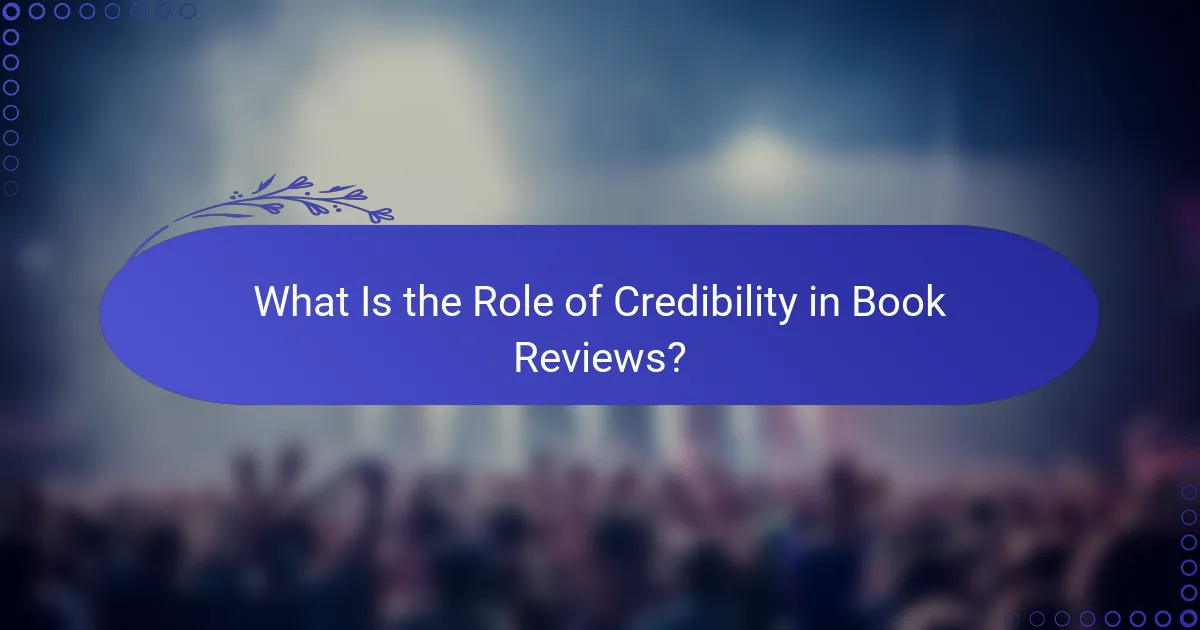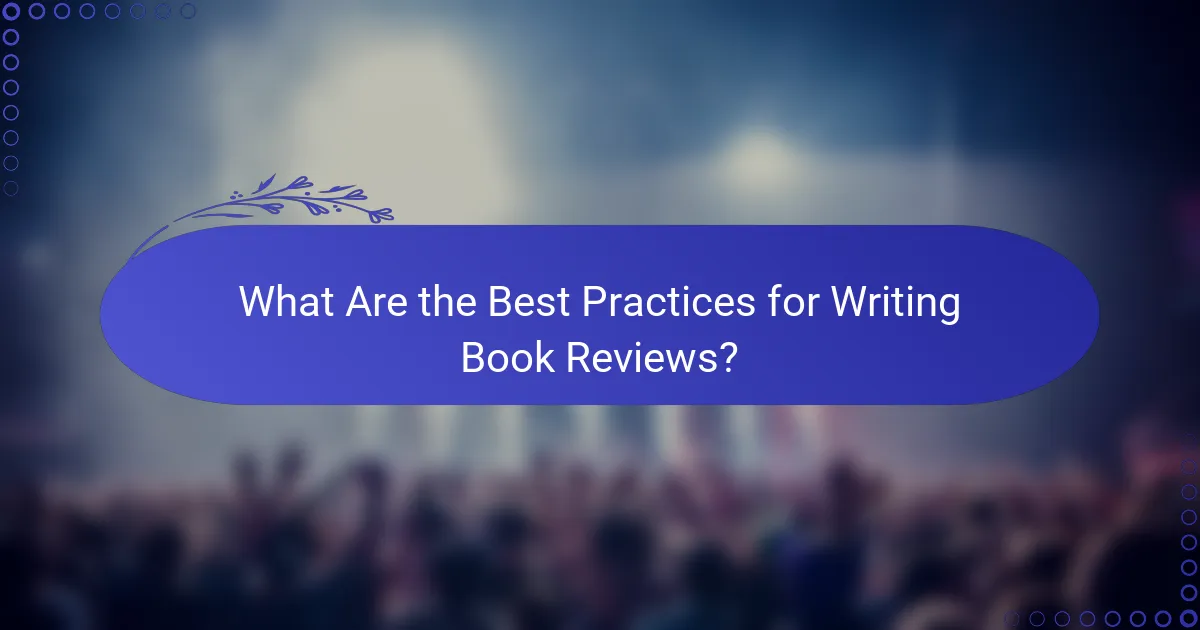Book reviews play a vital role in enhancing a book’s visibility, making it more likely to be discovered by potential readers. They not only serve as social proof but also establish credibility, influencing how readers perceive the quality and value of a book. By leveraging positive reviews, authors can significantly boost their sales and strengthen their reputation in the literary market. Promotions and discounts can further drive this engagement, as highlighted in this article.

How Do Book Reviews Impact Visibility?
Book reviews significantly enhance visibility by increasing the likelihood of discovery through various channels. They serve as social proof, encouraging potential readers to engage with the book and its author.
Increased online presence
Book reviews contribute to a stronger online presence by generating content across multiple platforms. When readers post reviews on sites like Amazon, Goodreads, or personal blogs, they create backlinks that improve the book’s visibility.
Encouraging readers to share their thoughts can lead to a ripple effect, where more people discover the book through shared links and recommendations. This organic promotion is invaluable for authors looking to expand their audience.
Improved search engine rankings
Positive book reviews can enhance search engine rankings, making it easier for potential readers to find the book online. Search engines prioritize content with high engagement, and reviews often attract comments and shares, boosting visibility.
To leverage this, authors should encourage readers to leave reviews on popular platforms. The more reviews a book has, the more likely it is to appear in search results, especially for relevant keywords.
Enhanced social media engagement
Book reviews can significantly boost social media engagement by sparking conversations around the book. When readers share their reviews on platforms like Instagram or Twitter, it creates buzz and encourages others to join the discussion.
Authors can amplify this effect by actively engaging with readers who post reviews, sharing their content, and responding to comments. This interaction not only builds community but also increases the book’s visibility across social media channels.

What Is the Role of Credibility in Book Reviews?
Credibility in book reviews is crucial as it influences how potential readers perceive the quality and value of a book. Reviews from trusted sources can significantly sway reader decisions and enhance the author’s reputation.
Influence on reader trust
Credible reviews build trust among readers, making them more likely to consider purchasing a book. When a review comes from a respected publication or a well-known critic, it can validate the book’s content and the author’s expertise.
Readers often look for reviews that highlight specific strengths or weaknesses, which can guide their purchasing decisions. A review that resonates with their preferences can lead to increased interest and engagement with the book.
Impact on author reputation
An author’s reputation can be significantly enhanced by credible reviews, as they reflect the quality of their work. Positive reviews can establish an author as a reliable voice in their genre, leading to a loyal readership.
Conversely, negative reviews from credible sources can damage an author’s reputation, making it harder for them to attract new readers. Authors should actively seek reviews from reputable platforms to bolster their standing in the literary community.
Effect on sales conversion rates
Credible book reviews can lead to higher sales conversion rates by influencing potential buyers’ perceptions. A well-reviewed book is more likely to be purchased, especially if the review highlights its unique selling points.
Research indicates that books with positive reviews can see sales increases ranging from 20% to 50%. Authors and publishers should prioritize obtaining credible reviews to maximize their book’s market potential.

How Can Authors Leverage Book Reviews for Sales?
Authors can significantly boost their book sales by effectively leveraging book reviews. Positive reviews enhance credibility, attract new readers, and can be strategically used in marketing efforts.
Utilizing positive reviews in marketing
Incorporating positive reviews into marketing materials can create a compelling narrative around a book. Authors should highlight glowing testimonials on their websites, social media platforms, and in promotional emails. For instance, featuring a review from a well-known critic can lend authority and attract attention.
Consider creating graphics or quotes from reviews to share on social media. This visual approach can increase engagement and reach, making the reviews more shareable and impactful.
Encouraging reader-generated content
Encouraging readers to leave reviews can create a steady stream of user-generated content that boosts visibility. Authors can prompt readers to share their thoughts on platforms like Goodreads, Amazon, or personal blogs. Offering incentives, such as exclusive content or giveaways, can motivate readers to participate.
Engaging with readers through social media and asking for their feedback can also foster a community around the book. This interaction not only generates reviews but also builds loyalty among readers.
Building relationships with reviewers
Establishing connections with reviewers can lead to more in-depth and favorable reviews. Authors should identify influential reviewers in their genre and reach out with personalized messages, offering copies of their books for honest feedback. Building rapport can encourage reviewers to promote the book further.
Participating in book blogs, podcasts, and virtual events can also help authors connect with reviewers. These relationships can lead to ongoing support and increased visibility for future releases.

What Are Effective Strategies for Gaining Book Reviews?
Effective strategies for gaining book reviews include engaging with book bloggers, utilizing social media outreach, and offering advanced reader copies. These methods can enhance visibility and credibility, ultimately impacting sales positively.
Engaging with book bloggers
Connecting with book bloggers can significantly boost your book’s exposure. Identify bloggers who specialize in your genre and have an engaged readership. Reach out with a personalized message that highlights why your book would resonate with their audience.
Consider offering a free copy of your book in exchange for an honest review. Be respectful of their time and guidelines, and follow up politely if you don’t hear back within a reasonable timeframe.
Using social media outreach
Social media platforms are powerful tools for gaining book reviews. Create engaging content that showcases your book, such as quotes, cover reveals, or behind-the-scenes insights. Use relevant hashtags to reach a broader audience.
Engage with readers directly by asking for their thoughts on your book or hosting giveaways. Building a community around your work can lead to more reviews as readers feel more connected to you as an author.
Offering advanced reader copies
Providing advanced reader copies (ARCs) is an effective way to generate buzz before your book’s official release. Distribute ARCs to select reviewers, bloggers, and influencers who can share their thoughts ahead of launch day.
When offering ARCs, set clear expectations regarding the review timeline and format. This proactive approach can lead to a collection of reviews that will enhance your book’s credibility and visibility upon release.

How Do Different Platforms Affect Book Review Visibility?
Different platforms significantly influence the visibility of book reviews, impacting how potential readers discover and assess books. Factors such as algorithms, community engagement, and social media presence play crucial roles in determining a review’s reach and effectiveness.
Amazon review algorithms
Amazon’s review algorithms prioritize reviews based on several factors, including recency, helpfulness ratings, and the reviewer’s purchase history. Reviews that receive more “helpful” votes tend to rank higher, making them more visible to shoppers. Authors should encourage readers to leave thoughtful feedback to enhance their review’s visibility.
Additionally, verified purchase reviews often carry more weight, so authors should strive to generate reviews from actual buyers. Engaging with readers post-purchase can lead to more authentic reviews, which can significantly improve a book’s ranking on Amazon.
Goodreads community engagement
Goodreads thrives on community interaction, where user-generated content drives visibility. Reviews that spark discussions or receive comments can gain traction, leading to increased visibility among users. Authors should consider participating in Goodreads groups or hosting giveaways to engage with readers and encourage reviews.
Moreover, the platform’s rating system allows users to see how many people rated a book, which can influence potential readers’ decisions. Authors should aim to build a following on Goodreads to enhance their book’s visibility through organic community engagement.
Influence of social media platforms
Social media platforms like Instagram, Twitter, and TikTok have become vital for book promotion, with many readers relying on influencers for recommendations. A single post or video can lead to significant spikes in visibility and sales, especially if it goes viral. Authors should actively engage with book communities on these platforms to maximize their reach.
Creating shareable content, such as visually appealing graphics or engaging videos, can help authors tap into these audiences. Collaborating with book influencers or participating in trending challenges can further enhance visibility and drive traffic to reviews on other platforms.

What Are the Best Practices for Writing Book Reviews?
Effective book reviews are structured, insightful, and honest evaluations that help readers decide whether to read a book. Following best practices can enhance the clarity and impact of your reviews, making them more valuable to potential readers.
Structuring reviews for clarity
A well-structured review enhances readability and comprehension. Start with a brief summary of the book’s plot, main themes, and characters, followed by your analysis and evaluation. Use clear headings or bullet points to separate different sections of your review, making it easier for readers to navigate.
Consider using a standard format, such as introduction, summary, analysis, and conclusion. This approach provides a logical flow and ensures that you cover all essential aspects of the book.
Incorporating personal insights
Personal insights can enrich your review by providing a unique perspective. Share how the book resonated with you, any emotional responses it evoked, or how it relates to your experiences. This personal touch can help readers connect with your review on a deeper level.
However, balance your personal opinions with objective analysis. Avoid letting your feelings overshadow the book’s merits or drawbacks, and ensure that your insights support your overall evaluation.
Maintaining objectivity and honesty
Objectivity and honesty are crucial for credible book reviews. Present both strengths and weaknesses of the book, providing a fair assessment rather than a biased opinion. This balanced approach builds trust with your readers.
Be transparent about your preferences and biases. If you typically enjoy a specific genre or author, acknowledge this in your review. This transparency helps readers understand your perspective and gauge how it may influence your evaluation.
